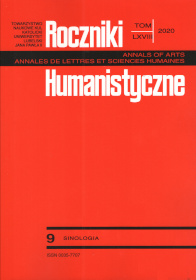Constructing a Moral Person in the Analects 論語 and Mengzi 孟子
Abstract
In early Chinese philosophy, the concept of a unique individual separated from the outside world has no ontological basis. Every person is an open, interdependent construction, whose uniqueness can only be achieved and cannot be given. A person is an undetermined range and locus of experiences expressed through specific roles and relationships. In this article, the Author analyses such an understanding of the person in Confucian and Mencian thought. In Confucius’ philosophy, the junzi 君子 lives up to his status as long as he maintains ren 仁 relationships and displays proper emotions connected to ren. The author argues that, in the Analects, ren is a concept connected to the terms shu 恕, zhong 忠, yi 義 and li 禮. Ren may be interpreted as an ideal interaction that starts with an emphatic reaction towards another human being. Emphatic reactions, along with zhong—a sense of duty— is the basis for applying the situational moral norm yi and carrying it out according to li—the social norm. Ren behaviour is different for every person in every situation. It has to be learned and practised during the process of self-cultivation, xiushen 修身.
Mencius’ moral theory is more complex, and concentrates on human nature and its features. According to this, human nature is shan 善, commonly translated as ‘good,’ because every person has four dispositions—emotions for developing ren, yi, li and zhi 智. Ren may be considered a virtue—it is not inborn, but has to be achieved and learned. Another skill required to be a sage was the understanding that every situation is unique, and that there is a right time to apply different norms—shizhong 詩中. Mencius’ thought is not simply an ethics of virtue, but it is also influenced by situational factors. Mencian moral behaviour is complex; not only does it require a deep understanding of oneself and the other, but also the use of all senses, sensitivity and creativity to deal with every situation in a different way. A sage, or a person who wants to become one, has to watch, listen, feel and understand every person and every situation. Moral cultivation in Mengzi’s thought is also a cultivation of the body’s qi 氣 (vigour or energy). Properly cultivated qi becomes haoran zhi qi 浩然之氣 (overflowing qi) and enables one’s body to have the zhi 志 (will) to follow its ren (heart/mind).
References
Ames, Roger, and Rosemont, Henry Jr. Confucian Role Ethics A Moral Vision for the 21st Century?. V&R Academic, 2016.
Behuniak, James. Mencius on Becoming Human. University of Hawaii at Manoa, 2002.
Cua, Antonio S. “Xin and Moral Failure: Notes on an Aspects of Mencius Moral Psychology.” Mencius Contexts and Interpretations, edited by Alan Kam-leung Chan. University of Hawaii Press, 2002.
Geaney, Jane. “Guarding Moral Boundaries: Shame in Early Confucianism.” Philosophy East and West, vol. 54, no. 2, 2004, pp. 113-142, doi: 10.1353/pew.2004.0004.
Kieschnick, John. “Analects 12.1 and the Commentarial Tradition.” Journal of the American Oriental Society, vol. 112, no 4, 1992, pp. 567-576, doi: 10.2307/604471
Lai, Karyn. “Confucian Moral Cultivation. Some Parallels with Musical Training.” The Moral Circle and Self: Chinese and Western Approaches, edited by Kim-chong Chong, Sor-hoon Tan, and C.L. Ten. Carus Publishing, 2003, pp. 107-139.
Lai, Karyn. “Confucian Moral Thinking.” Philosophy East and West, vol. 45, no. 2, 1995, pp. 249-272, doi: 10.2307/1399567.
Lai, Karyn. Learning form Chinese Philosophies: ethics of Independent and contextualised self. Ashgate Publishing Company & Routledge, 2006.
Lai, Karyn. “Li in the Analects: Training In Moral Competence and the Question of flexibility.” Philosophy East and West, vol. 56, no. 1, 2006, pp. 69-83, doi: 10.1353/pew.2006.0001.
Lau, D.C., trans. The Analects of Confucius. The Analects. Penguin Books, 1979.
Lau, D.C., trans. Mencius, revised edition, The Chinese University Press, 2003; first published 1970 by Penguin Books.
Legge, James, trans. The Chinese Classics, vol. 1: Confucian Analects, The Great Learning and The Doctrine of the Mean. Clarendon Press, 1893.
McRae, Emily. “The Cultivation of Moral Feelings and Mengzi’s Method of Extension.” Philosophy East and West, vol. 61, no. 4, 2011, pp. 587-608, doi: 10.1353/pew.2011.0050.
Seok, Bongrae. Embodied Moral Psychology and Confucian Philosophy. Lanham: Lexington Books, 2013.
Quanxing, Xu, and Huang Deyuan. “Theory on the Cultivation of Cognitive Subjects in Chinese Philosophy.” Frontiers of Philosophy in China, vol. 3, no. 1, 2008, pp. 39-54, doi: 10.1007/ s11466-008-0003-0.
Internet resources
Chinese Text Project, www.ctext.org/confucianism. Accessed 13.01.2019.
Eno, Robert. “The Analects of Confucius. An Online Teaching Translation.” 2012. Indiana University, Bloomington, www.indiana. edu/~p374/Analects_of_Confucius_(Eno-2012).pdf. Accessed 24.03.2019.
Eno, Robert. “The Great Lerning and the Doctrine of Mean: An Online Teaching Translation.” 2016. Indiana University, Bloomington, www.indiana.edu/~p374/Daxue-Zhongyong.pdf. Accessed 30.04.2019.
Eno, Robert. “Mencius: Translations, Notes and Commentary.” 2016. Indiana University, Bloomington, www.indiana.edu/~p374/Mencius%20(Eno-2016).pdf. Accessed 30.04.2019.
Copyright (c) 2020 Roczniki Humanistyczne

This work is licensed under a Creative Commons Attribution-NonCommercial-NoDerivatives 4.0 International License.





